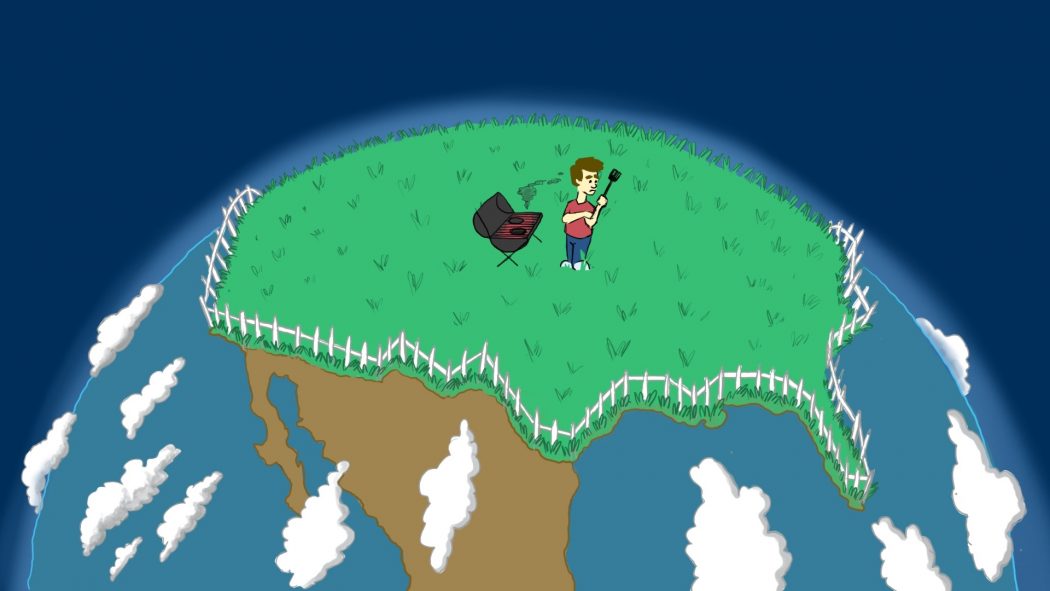Opinion: Understanding America’s global privilege
A sheltered worldview is developed when someone’s life experiences are insular, and they have never been exposed to other ideas or peoples. While none of us have a fully enlightened or “woke” view of the world, it is undisputed that there are varying degrees to which people have a sheltered worldview. In fact, in my mind, there is one sheltered worldview that is so common that it runs through the veins of our nation. As Americans, we often like to view America as the center of the universe because of our overwhelming influence in the world, but the truth is that Americans are a minority in the world population, and our egocentrism distracts us from larger global issues.
America is undoubtedly a very influential country. We have the largest GDP in the world, the largest military budget in the world, and arguably have the largest population of any economically developed nation in “the West.” All of these factors contribute to the United States’ immense influence on the global stage. America’s culture influences the world over, and that will become immediately apparent if you travel abroad. Yet, despite the country’s influence, America’s population is only 329 million out of 7.6 billion. This is merely 4.3% of the world’s population, yet we often act like the borders of the United States are the borders of the world, and this shallow framework prevents us from engaging in vital work to help better the world around us.
For instance, the median household income in America between 2017 and 2018 was $61,937. This may seem like rather modest means to most Americans, but the truth is that this income figure would place an individual in the wealthiest 1.3% of people in the entire world. Growing up in the United States my entire life, I had no idea the privilege I had been bestowed with. I had projected my own life experience onto the world. I assumed that life everywhere was like life in America. Yet, in some parts of the world, the average person experiences working conditions and wages that most Americans could not even fathom. American citizenship provides an innate privilege that is often neglected.
In Famine, Affluence, and Morality, Princeton moral philosopher Peter Singer notes how our perception of moral responsibility is illogical. He aptly points out that most people will act on an immediate and proximate moral issue, such as a child drowning, but will be apathetic to remote issues, even when they can contribute, such as donating to refugees. It is this bias that clouds our judgment as a nation.
Many contemporary ethicists argue that moral responsibility is akin to ability. Your ability to save a drowning child necessitates a moral responsibility to help the child. Americans have an abundance of opportunities that much of the world’s population would give anything to have. If someone has even an inkling of belief in social responsibility, our overwhelming level of privilege necessitates a strong moral responsibility to help the developing world.
How it is best to help others is up for debate. However, we cannot even start the conversation about how to use our privilege for good if we are too busy bickering within the walls of our own insular star-spangled mansion.

Kristian Fors is a student at Utah State University majoring in Economics and is an opinion columnist for the Utah Statesman. He enjoys studying psychology, traveling, and living life as intentionally as possible.
—krfors@gmail.com

Graphic created by Keith Wilson.


If you’re trying to make me feel guilty for being born in this great nation, raised by great and responsible parents in this wonderful Valley, then it’s not working. I’ve lived and worked on the Navajo Indian Reservation for 5 yrs. Been to Mexico, China, Hong Kong, Japan, S Korea and I wouldn’t trade any of those experiences for being a proud American. I’m not buying the “WOKE” crap. Spare me your adolescent lecture for waking up one day and discovering I’m blessed.